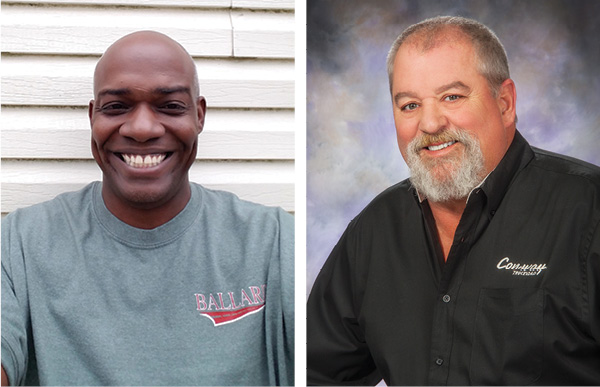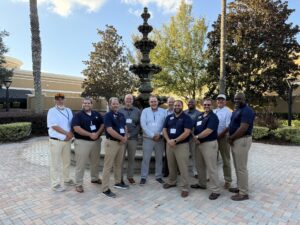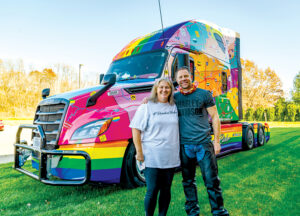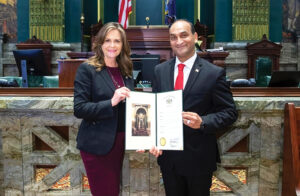ENGELWOOD, Colo. — Picture this scenario: You’re fueling up your vehicle and stopping to shower and rest for the night. Weary-eyed from the day’s long drive, you can’t help but look forward to a meal, the chance to rinse off and crawl into bed.
After filling your tank, you look up — and there’s a young girl with eyes filled with both hope and hopelessness. She can’t be more than 14 or 15, and her clothes have a worn, torn look. You feel something twist in your stomach; you know something isn’t right. Beaten, bruised and abandoned, she looks to you and asks for help.
There are 328 million people in the United States, and more than 40 million of them are prisoners to human trafficking. This girl could be one of them.
You have to make a decision: Will you help her? Will you help when there are men and women of all ages sold into human trafficking? Will you know how to help?
These are the questions to which Truckers Against Trafficking (TAT), a nonprofit organization, seeks to help drivers and motor carriers find answers.
“We recognize that the trucking industry is really part of the solution,” said Louie Greek, training specialist for TAT. “There’s millions of industry employees and drivers all over America, all over our highways in commercial or residential areas. We recognize that these folks can be the extra set of eyes and ears for law enforcement.”
Through TAT’s training programs, drivers can learn to recognize cases of human trafficking and how to properly report it. Drivers can be trained to ask specific questions when interacting with a potential victim.
Motor carriers and drivers are eligible for TAT training at no cost. Once a carrier is TAT trained, it can provide the training to all of its employees. Once a driver is trained, he or she can look out for the “red flag indicators” when faced with a potential trafficking victim.
“Some of those indicators may be seeing a lone child or young adult at a truck stop or a restaurant,” Greek said. “Maybe they see someone flashing their lights, back where the trucks are parked. Sometimes, but not always, that can indicate that there’s commercial sex available or someone is trying to elicit commercial sex.”
Other indicators could include be a person talking about making money or reaching a quota. or referencing abuse and a trafficker.
Driver heeds cry for help
Arian Taylor, a truck driver with Ballard Inc., was faced with such a situation one evening in January 2018.
Taylor was doing paperwork in his truck one night in Compton, California, when he heard the sound of car doors slamming and people shouting. Taylor continued to carry on with his work, assuming the ruckus wasn’t anything that required his direct attention.
Thirty minutes later, the situation DID require his direct attention.
A young girl, clutching a garbage bag full of clothes, knocked on the door of Taylor’s truck and asked if he could get her home.
“I was like, ‘I’m not totally sure, but I’ll find a way for you to get home,’” Taylor recalled. “I was trying to coax her into the truck, because the last place (traffickers) would expect her to be (hiding) was inside of a truck.”
Taylor proceeded to offer the girl blankets, water, food — whatever she needed. Sitting there in the truck, she told Taylor her story.
She and some girlfriends had gone to Los Angeles for vacation, but they ran out of money. An acquaintance told the girl he could help her not only stay in the city, but also make money. She refused, but as days went by, he became more persistent. Eventually, when she continued to refuse his “offer,” he threw her out of the car — literally — and left her near the ports.
“It’s not a great area at all, and he dropped her off basically to leave her for dead or get picked up,” Taylor said. “Who knows what would have happened to her if she got picked up by somebody else.”
Taylor started exploring options for women’s shelters, but the girl became agitated when he suggested finding a shelter or calling the police. Luckily, Taylor remembered his TAT training. He called the National Trafficking Hotline and connected with a cab company that could take her to a women’s shelter for a night to get food and water before going home.
In the end, the girl got into the offered cab and thanked Taylor for his help, and he warned her about the area and wished her a safe journey back home. Taylor then updated the hotline about the girl’s progress.
“The only thing truck drivers have to do out here is drive and think the entire time,” he said. “Of course, something like that is going to stay on my mind for a while without some proper resolution.”
He was anxious to hear about what happened next in the girl’s journey. His fears were allayed when he received word a couple of days later that the girl made it home.
Because of Taylor’s actions, he was awarded TAT’s Harriet Tubman award for 2018. The award recognizes drivers who have “taken the initiative of going above and beyond,” Greek explained.
“Because of Harriet Tubman’s connection to transportation through the Underground Railroad and her heroic work to free slaves, TAT believes she epitomizes the symbol of freedom that a trucking and/or busing anti-trafficking award represents,” said Kendis Paris, TAT’s executive director, adding that the organization created the Harriet Tubman award to recognize, at both local and national levels, the actions of truck drivers in the war against human trafficking.
“Just me having my name hooked up to any part of Harriet Tubman and what she stood for is an honor,” Taylor said. “When I was able to save the girl from being trafficked, it’s just something that anybody would do. The way I looked at it was that this was somebody’s daughter, and she lost her way and needed a guiding light to get her home. I was just fortunate enough to have the information that I needed to get her home.”
The Harriet Tubman award is presented annually to a member of the trucking industry who makes a call to the hotline or to law enforcement that leads to successful recovery of a victim or the arrest of the trafficker.
Something seemed out of place
Kevin Kimmel’s, a recipient of the Harriet Tubman award and now a retired truck driver, was able to accomplish both goals of safety for the victim and the arrest of the trafficker.
Before retirement, Kimmel made night deliveries for Con-Way Truckload. One morning in 2015, after making deliveries in a rural area, he noticed an old RV with black curtains parked near a truck stop.
“It didn’t really fit in that situation,” Kimmel said of the RV. “RVs are usually gone in the morning; they don’t drive nights. And I have never seen one with black curtains before, either.”
Kimmel knew something wasn’t right. There was obvious movement in the RV, and he remembers seeing what appeared to be a girl peering out from the curtains and then being jerked away.
Even though Kimmel’s company didn’t offer TAT training, he immediately knew he should call law enforcement.
“They had sheriffs and state troopers (on the scene) in five minutes,” he said. “That’s when they started pulling people out in handcuffs.”
When police responded to Kimmel’s call, they found an Iowa couple in the RV, along with a 20-year-old woman who appeared to be frightened and malnourished.
The young woman told officers that the couple had kidnapped her two weeks earlier in Iowa, had physically and sexually abused her and then forced her into prostitution. The couple was arrested and charged with sex trafficking.
Kimmel stayed on the scene for hours that day, giving his testimony to the fire department, the police and even the Federal Bureau of Investigation. The couple involved were arrested and sentenced to 40 years in prison.
“The judge refused to take the plea,” Kimmel said. “He said he’s never seen such a horrendous case.”
These days, Kimmel works with TAT’s driver project vehicle, when it’s in his area, to show others what TAT represents and how the organization can help victims of trafficking.
“It’s a dark world to think that people could do that to other humans,” he said. “It’s pretty sad.”
The war continues
The war against human trafficking is far from over — and individuals don’t have to be members of law enforcement to help win battles. All that is needed is a set of eyes and ears, along with a mindset of, “if you see something, say something.” In short, it is all about people looking out for other people.
“Human trafficking is a local crime that is happening to your neighbor’s child,” Kirsta Melton, founder of the Institute to Combat Trafficking says in the TAT training video. “It is a crime that is happening in your city. It is a crime that could happen to your child.”
Truck drivers have a bird’s-eye view of the nation’s highways and truck stops every single day.
“It really helps combat overall issues of human trafficking, because there’s only so many law enforcement (officers) out there,” Greek said. “But if you train 1 million drivers — as we’ve done so far, with many more to still train — you now have this huge army of drivers out there that care, that know this is occurring, and are in places where law enforcement or the general public isn’t. They can now really be assisting law enforcement.”
A phone call to the National Human Trafficking hotline at 888-373-7888 can lead to the recovery of victims and arrests of traffickers. The question each driver must ask themselves is this: Will you answer a cry for help?
Hannah Butler is a lover of interesting people, places, photos and the written word. Butler is a former community newspaper reporter and editor for Arkansas Tech University’s student newspaper. Butler is currently finishing up her undergraduate print journalism degree and hopes to pursue higher education. Her work has been featured in at least nine different publications.















I beleive this is a really good article, I also enjoy how these girls get rescued. I beleive at one time TAT was a good organization, but like any organization or company once they get too big, the caring factor goes away
Years ago I was asked a favor by TAT, I did as they asked and only got a knife stuck in my back as so it felt by Kendis Paris.
As a truck driver I still have a passion to see these girls saved, and I will continue to do as I always have done but as far as being involved with TAT, there has been much hurt in my life by this organization, mainly by the director Kendis Paris and her sister
This is not only a great story but a salute to Truckers Against Trafficking. We are proud to support this amazing organization and salute Arian and Kevin. We need more alert drivers like this recognizing and reporting this sickening crime. Imagine it’s your own daughter or grand-daughter.